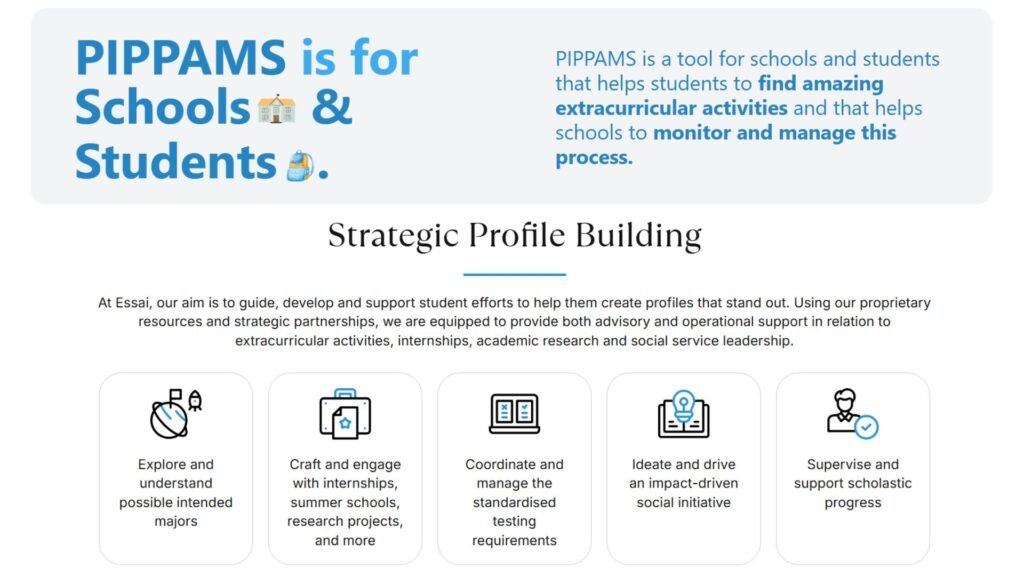Are you overwhelmed by your schedule, but unsure how to quit extracurricular activities without hurting your Ivy League chances?
Have you stuck with a club just because it “looks good,” even though it no longer excites or challenges you?
Wondering how to quit extracurriculars the right way, so admissions officers see maturity, not inconsistency?
Here’s the truth: knowing how to quit extracurricular commitments strategically can boost your college application.
Especially if it frees you up to pursue more meaningful and deeper goals.
Understanding How to Quit Extracurricular Activities Strategically

Quitting an extracurricular doesn’t mean giving up; it means growing up.
Many high-achieving students believe they need to “do it all” to impress Ivy League admissions officers.
But in reality, piling on activities that no longer serve your goals can dilute your narrative and lead to burnout. Strategic quitting isn’t about less effort—it’s about better alignment.
Understanding how to quit extracurricular activities strategically means evaluating your time, interests, and goals through a long-term lens.
It means asking tough questions: Is this helping me grow? Does it align with my future? Could my time be used more meaningfully elsewhere?
When you quit with purpose—by reflecting deeply, planning ahead, and replacing the activity with something more impactful—you show maturity, self-awareness, and clarity of direction.
And those are precisely the traits Ivy League schools are looking for.
Strategic quitting is not a step backward; it’s a strategic move forward.
Questions to Ask Before Quitting
Deciding how to quit an extracurricular can be a smart move—but only if done with clarity and purpose.
Ivy League admissions officers don’t penalize you for stepping away from an activity.
What they value more is self-awareness, thoughtful decision-making, and a precise alignment between your activities and long-term goals.
Before you decide to quit, ask yourself these essential questions to ensure it’s the right step forward:
1. Does this activity align with my long-term goals or academic interests?
Before deciding how to quit an extracurricular, this is one of the most important questions to ask.
Ivy League colleges look for coherence in your application—your activities, interests, and academic goals should tell a clear, unified story.
If an activity doesn’t support that narrative, it may not be worth the time and effort.
For example, suppose you’re passionate about biomedical engineering but spend significant hours each week in a school drama club that no longer excites you or contributes to your personal growth. In that case, it might be time to reevaluate.
That time could instead be invested in a research project, science competition, or internship aligned with your academic path.
Quitting an activity that doesn’t match your direction isn’t a weakness—it shows maturity.
It demonstrates that you understand how to prioritize and make intentional choices that align with your goals.
At Essai, we guide students to craft profiles that reflect focused ambition.
When your extracurriculars support your future aspirations, your application becomes more compelling and purposeful.
2. Am I gaining valuable skills or personal growth from this?
This question helps you evaluate whether the extracurricular activity continues to contribute to your development.
Ivy League schools are not just looking at what you did—they’re looking at how you grew through it.
If an activity is no longer helping you develop new skills, challenge yourself, or evolve as a person, its value in your application diminishes.
Ask yourself: Have I learned leadership, collaboration, problem-solving, or discipline through this activity? Or has it become routine and unfulfilling?
If you’re simply attending meetings or going through the motions without any new learning or engagement, it may be time to move on.
Extracurricular activities should challenge you in meaningful ways. They should push you to take initiative, overcome challenges, and reflect on your interests and capabilities.
If an activity no longer provides that space for growth, quitting it—strategically—can allow you to seek out experiences that do.
At Essai, we help students identify which activities offer actual value and which ones might be replaced with something that better reflects their evolving goals and potential.
3. Have I reached a plateau?
Reaching a plateau in an extracurricular means you’ve exhausted its growth opportunities—you’re no longer learning new skills, advancing in responsibility, or feeling challenged.
For students aiming for Ivy League admissions, this can be a sign that it’s time to reassess your involvement.
Ask yourself: Have I already achieved everything this activity can offer me? Am I still engaged, or just coasting?
For example, if you’ve been part of a club for two years but haven’t taken on a leadership role, led a project, or expanded your contribution, you may have hit a ceiling.
Staying in an activity without meaningful progress doesn’t add depth to your college application.
Ivy League schools are seeking students who demonstrate initiative and forward momentum.
If an activity no longer helps you grow, it’s smarter to quit and focus on more impactful pursuits.
At Essai, we help students recognize these plateaus early and transition smoothly into higher-value opportunities that elevate their profiles and reflect a clear sense of purpose.
4. What will I do with the time I regain?
Quitting an extracurricular only benefits your Ivy League application if you use that regained time wisely.
Simply freeing up your schedule isn’t enough—admissions officers want to see that you’ve redirected your energy into something more meaningful and aligned with your goals.
Before quitting, consider how the extra time will serve your overall narrative.
Could you start a research project, take on a leadership role, volunteer in your community, build a portfolio, or deepen your academic focus?
The key is to replace that time with activities that demonstrate initiative, depth, and impact.
At Essai, we help students plan this transition thoughtfully.
When quitting an activity leads to a higher-value experience, it not only strengthens your profile but also shows maturity and strategic thinking—both of which are highly valued in Ivy League admissions.
5. Am I quitting due to temporary discomfort or a deeper issue?
Before deciding how to quit an extracurricular, it’s important to distinguish between short-term frustration and long-term misalignment.
Temporary discomfort—like a challenging project, team conflict, or time crunch—can often be overcome and may even lead to growth.
But if the activity consistently feels draining, unfulfilling, or disconnected from your goals, it may signal a deeper issue.
Ask yourself: Am I avoiding a challenge, or is this genuinely no longer serving me?
Ivy League admissions officers respect resilience, but they also value students who can recognize when an activity has run its course and make thoughtful decisions based on that insight.
Quitting out of impatience can reflect poorly on you. But quitting because you’ve reflected deeply and chosen to prioritize something more impactful demonstrates maturity.
At Essai, we help students evaluate these situations clearly so that any decision to quit is strategic, not emotional.
6. Can I explain this decision if asked in an interview or essay?
If you’re considering quitting an extracurricular, you should be prepared to explain the decision clearly and confidently.
Especially if it’s brought up in an interview or mentioned in your application essays.
Admissions officers won’t judge the fact that you quit; they’ll be more interested in why you leave and what you chose to do instead.
A strong explanation shows the activity is no longer aligned with your goals and how quitting led to growth and more meaningful pursuits.
The key is to show maturity, intention, and thoughtful decision-making.
Avoid vague reasons—focus on purpose, like shifting time toward a passion-driven, meaningful pursuit.
At Essai, we help students craft compelling narratives around these decisions.
So they can speak authentically and strategically about every choice on their journey to top-tier college admissions.
7. Am I staying only because I fear how quitting will look?
Staying in an extracurricular just to avoid the appearance of quitting is not a strong reason to continue.
If the activity no longer brings value, aligns with your goals, or contributes to your personal growth, continuing out of fear may weaken your overall profile.
Ivy League admissions officers value authenticity over optics. They can often tell when students are simply filling space on a resume.
What stands out more is a focused application built on genuine interests, not one padded with unnecessary or disconnected activities.
Ask yourself: If I weren’t applying to college, would I still be doing this? If the answer is no, it may be time to step away and invest in something that truly matters to you.
At Essai, we guide students to quit with purpose—showing clarity and maturity that colleges truly value.
8. Have I talked to a mentor or advisor?
Before quitting an extracurricular, get advice from a mentor who understands your academic and college goals.
They can offer an objective perspective on whether quitting aligns with your overall narrative or if there’s still untapped potential in the activity.
Often, what feels like a dead-end may just need a fresh approach or a slight shift in direction.
A mentor can help you assess the decision, align it with your Ivy League goals, and plan your next steps.
At Essai, our mentors work closely with students to ensure that every step—including quitting—is part of a bigger, more intentional plan.
With the proper guidance, you can make confident decisions that reflect maturity, focus, and a strong sense of purpose.
How to Quit an Extracurricular Strategically?
Knowing how to quit an extracurricular is only half the equation, how you quit is just as important.
Ivy League admissions officers aren’t concerned about the fact that you quit; they’re more interested in how thoughtfully and responsibly you handled the transition.
Strategic quitting shows maturity, planning, and purpose. Here’s a step-by-step guide to ensure your decision reflects strength, not inconsistency:
1. Reflect on the “Why”
Before quitting any extracurricular, take a step back and ask yourself why you’re considering it. Is it because you’ve lost interest?
Does it no longer align with your academic or career goals? Are you feeling overwhelmed and need to rebalance your time?
Understanding your true motivation is crucial to making a strategic, rather than emotional, decision.
Writing down your thoughts or discussing them with a mentor can bring clarity and insight.
Quitting should never be impulsive—it should be based on a thoughtful evaluation of whether the activity is still contributing to your growth or your Ivy League application goals.
When you reflect on the “why,” you ensure your decision is rooted in purpose, not pressure or temporary frustration.
2. Consider the Bigger Picture
Quitting an extracurricular should never be an isolated decision—it must fit within the broader context of your academic goals and college admissions strategy.
Ask yourself how this decision supports your overall narrative. Will it help you focus on a subject you’re passionate about?
Does it allow time for more meaningful projects or leadership opportunities?
Ivy League admissions officers look for clarity of purpose.
Your activities should collectively tell a story about who you are, what you value, and where you’re headed.
If an extracurricular doesn’t add to that story—or worse, distracts from it—it might be time to step away.
By considering the bigger picture, you ensure that quitting helps you sharpen your profile and strengthen your application, rather than creating gaps or confusion.
At Essai, we help students align each decision with the long-term vision of who they want to become.
3. Talk to a Mentor
Before quitting an extracurricular, seek guidance from a mentor who understands your academic and admissions goals.
A mentor offers objective insight and can help you assess whether quitting is genuinely the right move or if there’s another path forward within the activity that you haven’t explored.
Sometimes, what feels like a dead end may be an opportunity for leadership or innovation that you haven’t considered.
Other times, a mentor can help confirm that quitting will free up time for something more impactful.
At Essai, our mentors specialize in helping students align their decisions with Ivy League expectations.
Talking to someone experienced ensures that your choices are strategic, intentional, and part of a compelling overall application narrative.
4. Plan What You’ll Do Next
Quitting an extracurricular is only beneficial if you have a clear plan for how you’ll use that time.
Ivy League admissions officers want to see that you’ve made a purposeful decision—not just stepped away, but stepped into something more meaningful.
Ask yourself: Will I be willing to take on a leadership role elsewhere? Start a personal project? Join a research initiative?
Volunteer in a cause I care about? The goal is to replace the activity with something that adds greater value to your profile.
At Essai, we help students identify and pursue high-impact opportunities that align with their goals.
When quitting is paired with thoughtful action, it becomes a strategic step forward, not a setback.
5. Exit Respectfully
Once you’ve decided to quit, it’s essential to leave the extracurricular activity with professionalism and respect.
Inform your club leader, coach, or advisor ahead of time—don’t just stop showing up.
Express gratitude for the experience and, if possible, offer to help with a smooth transition, such as training a replacement or finishing ongoing tasks.
How you leave reflects your character. Ivy League admissions officers value maturity, responsibility, and integrity.
Exiting respectfully shows that you’re not just making a strategic decision—you’re handling it with thoughtfulness and class.
At Essai, we encourage students to view every experience, even those they may step away from, as an opportunity to demonstrate leadership and grace.
6. Keep Records of Your Involvement
Even if you decide to quit an extracurricular, your past contributions still matter.
Keeping track of your role and achievements ensures you can confidently include the activity in your college application if needed.
Document any leadership positions, projects you led, awards received, or measurable outcomes.
These details can strengthen your Common App activities section or help craft compelling stories in your personal essays.
At Essai, we guide students in organizing their accomplishments so that even past activities they’ve stepped away from continue to add value to their Ivy League narrative.
Quitting doesn’t erase your impact—unless you forget to record it.
7. Be Ready to Explain Your Decision
If your application or an interview raises questions about your choice to quit, be prepared to answer with confidence and clarity.
Focus on how the decision helped you grow, refocus, and pursue more meaningful goals.
Example:
“I realized my interest in medicine was growing, so I stepped away from Model UN to intern at a local hospital and begin biology research.
That shift helped me gain real-world experience aligned with my career path.”
Strategically quitting an extracurricular is not about giving up—it’s about choosing wisely.
The goal is to align your time, energy, and effort with activities that best represent who you are and what you’re aiming to become.
At Essai, we help students make these transitions seamlessly—ensuring every decision serves their bigger story.
Communicating Quitting in Your Application
If you’ve strategically chosen to quit an extracurricular, it’s essential to communicate that decision thoughtfully in your application.
Especially if the activity spanned a significant period or held a visible place in your profile.
Admissions officers don’t view quitting negatively when it’s done with purpose and clarity.
Instead, they appreciate students who can reflect, reassess, and make decisions that align with their goals.
In your application, focus on why you made the decision, what you learned from the experience, and how you used the freed-up time to pursue something more meaningful.
In your application or interview, frame quitting as a positive shift that allowed you to focus, grow, or prioritize well-being.
At Essai, we help students craft these narratives with clarity and confidence so their application tells a cohesive, authentic story—even when it includes a decision to step away.
How Essai & PIPPAMS Help with Strategic Extracurricular Decisions?

At Essai, we know that quitting an extracurricular is not just about freeing up time—it’s about aligning every decision with your Ivy League goals.
Our expert mentors work closely with students to evaluate whether an activity still supports their academic and personal narrative.
We help you reflect, prioritize, and pivot to higher-impact opportunities—whether that’s research, leadership, creative projects, or subject-aligned work.
But strategy doesn’t stop with reflection. That’s where PIPPAMS comes in.
PIPPAMS is a powerful platform we recommend for planning, tracking, and optimizing your extracurricular journey. It helps you:
- Monitor your activity timeline
- Identify gaps or redundancies
- Strategically document growth and leadership
- Ensure your profile remains focused and competitive
Together, Essai and PIPPAMS give you clarity and control. We guide your decisions, and PIPPAMS helps you stay organized and intentional, to your acceptance letter.
With the right support and structure, every extracurricular decision becomes a strategic move forward.
Conclusion
Knowing how to quit an extracurricular can become a turning point in your Ivy League journey.
Strategic quitting shows clarity, prioritization, and a commitment to authentic interests—qualities Ivy League schools value.
At Essai & PIPPAMS, we help you navigate these decisions, ensuring your activities align with your narrative, reduce stress, and maximize your admissions potential.
Take charge of your Ivy League application today. Book your consultation with Essai and start building a focused, powerful profile.
FAQs
Q1: How to quit an extracurricular without harming my application?
A: When it no longer aligns with your goals or is impacting your academics or mental health, and you have a plan to utilize your time purposefully.
Q2: Will quitting hurt my Ivy League chances?
A: No, if you quit strategically and focus on impactful, aligned activities.
Q3: Should I explain why I quit my application?
A: Yes, if relevant, showing how the decision helped you pursue your interests deeply.


